The 1980s can be considered to be the golden age of coffee farming in Kenya. Annual production peaked at 128,926 metric tonnes in 1987/88 and the sector emerged as a key driver of the national economy. Fast forward to today, and the picture is starkly different. Output has fallen by more than half over the decades, reaching just 48,700 metric tonnes in 2023, according to the Kenya National Bureau of Statistics Economic Survey 2024.
Once-flourishing coffee estates have been fragmented, as farmers turn to alternative crops or sell off parcels of land to real estate developers promising instant fortunes. By some estimates, the acreage under coffee in Kenya has declined by 30% from 170,000 ha in the 1990s to 119,000 ha in 2020.
The unmissable irony is that Kenya has failed to expand its coffee production at a time when the Arabica blend that is grown in the country is fetching a hefty premium in international markets. Arabica coffee futures, which track the price movements of Arabica coffee beans in global commodity markets, are currently trading at $370 per 60 kilograms – compared with a $100-$150 price range recorded in 2019 and 2020.
Indeed, it’s worth highlighting that of all of Kenya’s agricultural exports, none commands a greater price in international markets than coffee. This translates to higher incomes for coffee farmers. The Economic Survey indicates that coffee farmers earned Sh61,416 per 100 kg of coffee in 2023. In comparison, tea farmers earned Sh28,371. With coffee farming looking increasingly lucrative, the question on many minds is: how can Kenya reverse the fortunes of the coffee sector and expand output?
Supporting smallholder farmers
If Kenya is to revive its coffee sector, targeted interventions aimed at smallholder farmers are crucial. This is because an estimated 70% of coffee in the country is produced by smallholders, who group together in cooperatives to manage their farms more effectively. However, coffee farming is a demanding venture that requires significant labour, capital investment, and technical expertise.
Smallholder coffee farmers therefore need holistic support for them to successfully expand their output. Strengthening training programs, introducing accessible financing mechanisms, and promoting innovative cooperative models are just some of the reforms that will enable farmers to overcome barriers and make coffee farming a more sustainable, profitable venture.
Equally important is the need to restore agricultural extension services, which once played a pivotal role in ensuring that farmers had access to the latest knowledge, technologies and best agronomic practices.
As a coffee farmer myself, I can attest to the fact that having access to scientific knowledge on topics such as soil management, pest control, irrigation techniques, and improved seed varieties can dramatically improve yields and the quality of produce. We must therefore make it a priority to increase the level of technical support that we extend to smallholder coffee farmers through extension officers.
The major coffee-growing areas in Kenya – such as the highlands of Mount Kenya, Aberdare, Kisii, Kericho, Nandi and others – all enjoy conducive climatic and soil conditions for the cultivation of quality coffee. However, as climate change accelerates, this distinct geographic advantage can no longer be taken for granted. Rising temperatures, unpredictable rainfall, and shifting weather patterns threaten coffee yields, quality, and long-term sustainability.
We must therefore ensure that we promote climate-smart coffee farming and make the necessary investments to support adaptation to climate change. This means investing in drought-resistant coffee varieties to withstand erratic weather, enhancing soil conservation techniques to protect farms from degradation, and promoting agroforestry to regulate microclimates and shield crops from extreme conditions. We must also implement efficient irrigation systems to mitigate water scarcity.
Embracing technology
As artificial intelligence, precision farming, and data-driven decision-making revolutionise global food production, Kenyan coffee farmers must not be left behind. The integration of digital tools into farm management can enhance productivity, improve market access, and ensure long-term sustainability in the sector.
While the use of digital technology in agriculture is not new, adoption has been slow among smallholder coffee farmers due to pre-existing knowledge and skills gaps. Many lack training on how to properly use the latest devices and software, limiting their ability to interpret data that could potentially improve their yields or earnings.
Government-backed digital hubs, which have been set up across various counties to upskill rural populations and promote digital literacy, present a golden opportunity to address this challenge. If Kenya is serious about revitalizing its coffee industry, investing in digital upskilling must be a top priority – because a connected farmer is an empowered farmer.
Nobody has a crystal ball to tell where global coffee markets will go from here, but all indications point to the possibility that arabica coffee prices will remain elevated. This means that, if ever there was a time for Kenya to revive its coffee industry, it’s now when the reward for doing so is highest.
The question is, will Kenya seize this moment, or will it continue to watch as the earnings potential of one of its most valuable agricultural exports diminishes? It is indeed time for our farmers, policymakers, and investors to come together to address the systemic issues plaguing the coffee sector.
Want to continue reading? Subscribe today.
You've read all your free articles for this month! Subscribe now to enjoy full access to our content.
Digital Monthly
£8.00 / month
Receive full unlimited access to our articles, opinions, podcasts and more.
Digital Yearly
£70.00 / year
Our best value offer - save £26 and gain access to all of our digital content for an entire year!

 Sign in with Google
Sign in with Google 



